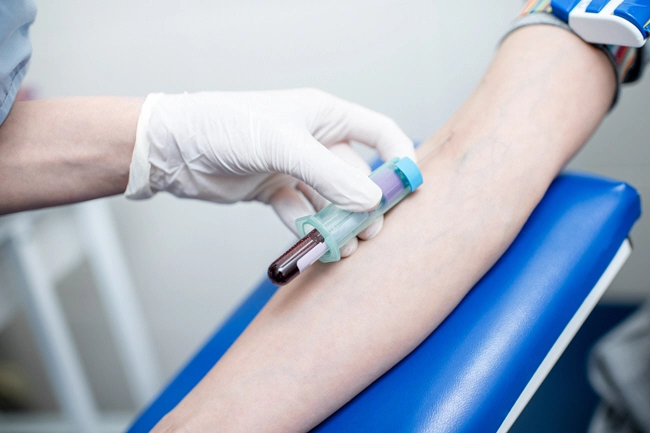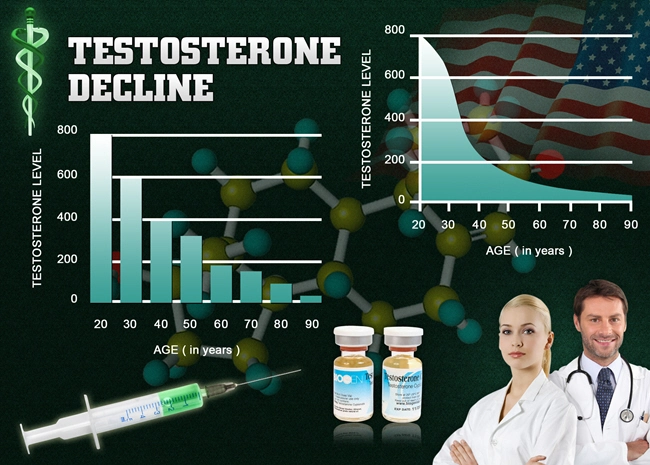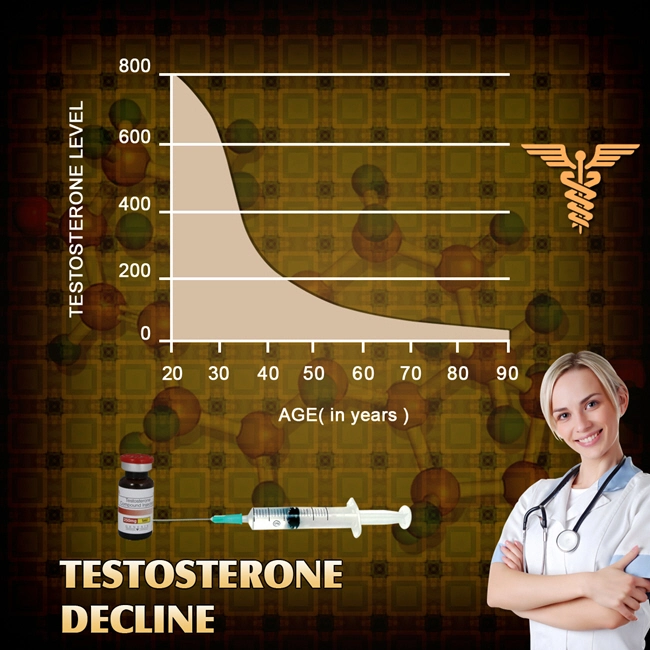
Research confirms: Low Testosterone in men increases the risk of death
For years, the media drumbeat has pounded away non-stop with warnings of the dangers of Testosterone Replacement Therapy (TRT). Here are just a few of the side effects that we have been warned about:
- Increased risk of prostate cancer
- Baldness
- Hyper-aggression
- Shrinking testicles
- Excess red blood cell products that elevate the risk of potentially deadly blood clots
- Reduced sperm production
- Acne
- Gynecomastia (enlarged breasts in men)
- Sleep apnea
- And more...much more
But is it true? Is TRT the significant risk to men’s health that some say?
In a word, NO! Recent research has determined that TRT when adequately applied under medical supervision, is safe and effective and can dramatically increase the quality of men’s lives.
Far from increasing the risk of death and severe side effects, it is low testosterone levels that place men at higher risk of poor health.
New research finds that men with low testosterone may be at a higher risk of cardiovascular disease and death.
- Several studies have determined that low testosterone in men was linked with an elevated risk of dying.
- Those with deficient testosterone have a higher risk of dying from Cardiovascular Disease (CVD).
- This might be because low testosterone is associated with certain CVD risk factors.
- Low testosterone can be detected with a simple blood test.
- Treatment may involve lifestyle changes or hormone replacement therapy.
The University of Western Australia researchers, along with other Australian researchers as well as researchers from Europe and North America, gathered 11 studies, including 24,000 people, to see how testosterone might influence the risk of death in older men.
 The researchers said their study is the first to perform an IPD meta-analysis of major prospective cohort studies that used mass spectrometry, considered the most accurate testosterone measurement method to measure DHT and estradiol accurately. They also had been followed for a minimum of five years.
The researchers said their study is the first to perform an IPD meta-analysis of major prospective cohort studies that used mass spectrometry, considered the most accurate testosterone measurement method to measure DHT and estradiol accurately. They also had been followed for a minimum of five years.
The team looked at individual patient data to understand relationships between baseline hormone concentrations (total testosterone, sex hormone-binding globulin, dihydrotestosterone, estradiol, luteinizing hormone) and the risk of cardiovascular events, cardiovascular disease deaths, and deaths from all causes.
They then looked for any relationships between these levels and people’s relative risk for cardiovascular events, cardiovascular deaths, or deaths from any cause.
After their analysis, they determined that men with low total testosterone (below 7.4 nmol/L [213 ng/dL]) had a greater risk of dying from any cause.
Further, those with deficient levels of testosterone (below 5.3 nmol/L [153 ng/dL]) had a higher risk of dying from cardiovascular disease.
According to the data, the researchers said only men with low total testosterone concentrations had higher risks for all-cause mortality.
They said a key finding was that men with a testosterone concentration below 7.4 nmol/L (<213 ng/dL) had a higher risk for all-cause mortality, regardless of LH (luteinizing hormone) concentration.
LH is a chemical messenger in a person’s bloodstream that controls the actions of specific cells or organs and plays a vital role in sexual development in children and fertility in adults.
The data concluded that men with a testosterone concentration below 5.3 nmol/L (<153 mg/dL) had an increased risk of cardiovascular death.
To perform the IPD meta-analysis, the researchers obtained raw data from nine included studies and reanalyzed the combined data. They said that allowed for “more sophisticated analysis of combined data from multiple studies and provided more robust testing for associations.”
The 11 studies in the meta-analysis were all prospective cohort studies of community-dwelling men who had sex steroids measured with mass spectrometry. The median age of men in the studies ranged from 49 to 76. The researchers obtained individual participant data from nine of these studies, which included more than 20,000 men, and aggregate data statistics from the other two studies, which included more than 3,000 men.
Using restricted cubic splines, the researchers modeled the testosterone data as a continuous variable. The primary outcomes were all-cause mortality, CVD death, and incident CVD events. Covariates for the fully adjusted analyses included age, body mass index, marital status, alcohol consumption, smoking, physical activity, hypertension, diabetes, creatine concentration, total to high-density lipoprotein cholesterol ratio, and lipid medication use.
A possible limitation of the studies is the men who participated were predominantly white and from Australia, Europe, and North America, so results should be confirmed in studies involving men of different ethnicities from other geographic regions, the researchers said. Another potential shortcoming of the meta-analysis was that sex hormones were measured in different laboratories at various times.
The findings are published in Annals of Internal Medicine.
Reaction to the low testosterone study
Dr. Yu-Ming Ni, a cardiologist and lipidologist at Memorial Care Heart and Vascular Institute at Orange Coast Medical Center in California, told Medical News Today that the study didn’t explain why the subjects had low testosterone.
“There may be many reasons, including obesity, liver issues, drug interactions, and other hormonal reasons for low testosterone,” said Ni, who wasn’t involved in the research. “Unless this is clarified in future research, it is uncertain whether low testosterone causes cardiovascular disease, and it would be unwise and potentially dangerous to assume that treatment of low testosterone with hormone replacement will reduce heart disease.”
potentially dangerous to assume that treatment of low testosterone with hormone replacement will reduce heart disease.”
Ni cited a study published in the New England Journal of Medicine as saying treatment of hypogonadism with testosterone replacement was not associated with higher rates of heart disease “and certainly not lower rates of heart disease.”
“Therefore, this study provides interesting information about the relationship between testosterone levels and heart disease, and further research is needed,” Ni said.
Karen Eilber, MD, a urologist and co-author of “A Woman’s Guide to Her Pelvic Floor: What the F*@# is Going On Down There,” who was not involved in the study, confirmed the association that was found between testosterone and death risk.
“What isn’t clear,” she added, “is whether testosterone levels directly contribute to death from these causes or low testosterone is just a sign of overall poor health.”
The study authors suggest that one reason low testosterone might be associated with worse health is the fact that lower testosterone leads to people having less muscle mass and more significant fat accumulation, which are both risk factors for cardiovascular disease.
S. Adam Ramin, MD, a board-certified urologist, urologic oncologist, and medical director of Urology Cancer Specialists in Los Angeles, California, who was also not part of the study, noted several possible health issues that could be associated with low testosterone.
“It is true that low testosterone will lead to lower sexual desire and possibly difficulty with erections,” he said. “However, low testosterone is also associated with many systemic medical problems.”
According to Ramin, these include loss of bone density, loss of muscle mass, weight gain, moodiness, fatigue, and depression.
“Furthermore, low testosterone may lead to heart attacks, strokes, and death,” he said.
Dr. Ramin discussed whether men should take testosterone supplements.
“This study confirms what I also discuss with my patients regarding risks of low testosterone,” Ramin, who was not involved in the research, told Medical News Today. “Although most people think of testosterone in terms of sexual function, this male hormone has many functions. It is true that low testosterone will lead to lower sexual desire and possibly difficulty with erections.”
Ramin said low testosterone is also associated with loss of bone density, loss of muscle mass, weight gain, moodiness, fatigue, and depression. He said low testosterone might also lead to heart attacks, strokes, and death.
“In my practice, most of my older male patients in their 80s and 90s who are spry, cognitively sharp, energetic, independent, muscular with strong stature and posture, have natural testosterone levels greater than 500, some in 600 to 700 levels,” Ramin said.
He added that men can naturally boost testosterone by losing belly fat, sleeping at least 6 hours each night, and avoiding processed foods.
Ramin also stated that certain supplements, such as DHEA, vitamin D3, Tribulus, and maca, might boost your levels. However, you should not take DHEA without your doctor’s supervision since there could be some safety concerns if you have prostate cancer. You should avoid supplements with estrogenic compounds like bioflavonoids as well.
If natural measures don’t help, your doctor can prescribe TRT. This can be administered orally, by injection, or through creams, gels, or patches applied to your skin.
Eilber explained that learning whether you have low testosterone requires only a simple blood test.
 However, she noted that if you have a low total testosterone, the test might not be as accurate.
However, she noted that if you have a low total testosterone, the test might not be as accurate.
“The testosterone level should be drawn mid-morning,” advised Eilber. This is when testosterone is at its peak for the day.
It’s also important to recognize that your report will contain two types of testosterone numbers: total and free.
“[Free’ testosterone is the form that is bio-available,” Eilber explained—being bio-available means that it can be easily put to use in your body.
Total testosterone measures both free testosterone and that which is bound to specific proteins in your blood and not immediately available for use.
How to deal with Low-T
If you have low testosterone, there are several things you can do to increase it, including:
- Lose weight now!
- Prioritize sleep.
- Stop wolfing down junk food.
- Get off the couch. A mix of cardiovascular exercise and strength resistance training will help boost testosterone levels.
- Minimize alcohol or avoid it altogether.
- Stay hydrated
- Avoiding soy products
- Strongly consider beginning a TRT regimen.
Contact us for a FREE, no-obligation discussion of the benefits of testosterone replacement therapy.
References
https://www.medicalnewstoday.com/articles/low-testosterone-can-affect-heart-health-and-increase-mortality-risk-study-finds#How-to-manage-low-testosterone
https://www.eurekalert.org/news-releases/1043830
https://www.healthline.com/health-news/low-testosterone-linked-with-higher-risk-of-death#What-you-can-do-about-low-testosterone
Abstract: https://www.acpjournals.org/doi/10.7326/M23-2781
Editorial: https://www.acpjournals.org/doi/10.7326/M24-0875
https://www.medpagetoday.com/endocrinology/generalendocrinology/110107
Contact Us Today For A Free Consultation
Dear Patient,
Once you have completing the above contact form, for security purposes and confirmation, please confirm your information by calling us.
Please call now: 1-800-380-5339.
Welcoming You To Our Clinic, Professor Tom Henderson.

- Our HGH Clinic And Web Site Privacy Policy [Last Updated On: May 23rd, 2019] [Originally Added On: December 14th, 2017]
- Idaho HGH Clinics [Last Updated On: August 26th, 2025] [Originally Added On: March 19th, 2018]
- Injectable HGH Prescriptions In Cheyenne, Wyoming [Last Updated On: April 15th, 2025] [Originally Added On: March 3rd, 2019]
- Injectable HGH Prescriptions In Milwaukee, Wisconsin [Last Updated On: April 19th, 2025] [Originally Added On: March 3rd, 2019]
- Injectable HGH Prescriptions In Madison, Wisconsin [Last Updated On: April 1st, 2025] [Originally Added On: March 3rd, 2019]
- Injectable HGH Prescriptions In Green Bay, Wisconsin [Last Updated On: March 22nd, 2025] [Originally Added On: March 3rd, 2019]
- Injectable HGH Prescriptions In Charleston, West Virginia [Last Updated On: May 17th, 2025] [Originally Added On: March 3rd, 2019]
- Injectable HGH Prescriptions In Vancouver, Washington [Last Updated On: February 18th, 2025] [Originally Added On: March 3rd, 2019]
- Injectable HGH Prescriptions In Tacoma, Washington [Last Updated On: January 16th, 2025] [Originally Added On: March 3rd, 2019]
- Injectable HGH Prescriptions In Spokane, Washington [Last Updated On: April 16th, 2025] [Originally Added On: March 3rd, 2019]
- Injectable HGH Prescriptions In Seattle, Washington [Last Updated On: May 30th, 2025] [Originally Added On: March 3rd, 2019]
- Injectable HGH Prescriptions In Washington D.C [Last Updated On: January 15th, 2025] [Originally Added On: March 3rd, 2019]
- Injectable HGH Prescriptions In Bellevue, Washington [Last Updated On: June 1st, 2025] [Originally Added On: March 3rd, 2019]
- Injectable HGH Prescriptions In Virginia Beach, Virginia [Last Updated On: January 18th, 2025] [Originally Added On: March 3rd, 2019]
- Injectable HGH Prescriptions In Richmond, Virginia [Last Updated On: January 25th, 2025] [Originally Added On: March 3rd, 2019]
- Injectable HGH Prescriptions In Portsmouth, Virginia [Last Updated On: April 10th, 2025] [Originally Added On: March 3rd, 2019]
- Injectable HGH Prescriptions In Norfolk, Virginia [Last Updated On: May 28th, 2025] [Originally Added On: March 3rd, 2019]
- Injectable HGH Prescriptions In Newport News, Virginia [Last Updated On: April 12th, 2025] [Originally Added On: March 3rd, 2019]
- Injectable HGH Prescriptions In Hampton, Virginia [Last Updated On: January 11th, 2025] [Originally Added On: March 3rd, 2019]
- Injectable HGH Prescriptions In Chesapeake, Virginia [Last Updated On: January 9th, 2025] [Originally Added On: March 3rd, 2019]
- Injectable HGH Prescriptions In Arlington, Virginia [Last Updated On: February 6th, 2025] [Originally Added On: March 3rd, 2019]
- Injectable HGH Prescriptions In Alexandria, Virginia [Last Updated On: May 24th, 2025] [Originally Added On: March 3rd, 2019]
- Injectable HGH Prescriptions In Montpelier, Vermont [Last Updated On: April 29th, 2025] [Originally Added On: March 3rd, 2019]
- Injectable HGH Prescriptions In West Valley City, Utah [Last Updated On: April 16th, 2025] [Originally Added On: March 3rd, 2019]
- Injectable HGH Prescriptions In West Jordan, Utah [Last Updated On: March 15th, 2025] [Originally Added On: March 3rd, 2019]
- Injectable HGH Prescriptions In Salt Lake City, Utah [Last Updated On: January 28th, 2025] [Originally Added On: March 3rd, 2019]
- Injectable HGH Prescriptions In Provo, Utah [Last Updated On: May 12th, 2025] [Originally Added On: March 3rd, 2019]
- Injectable HGH Prescriptions In Wichita Falls, Texas [Last Updated On: April 1st, 2025] [Originally Added On: March 3rd, 2019]
- Injectable HGH Prescriptions In Waco, Texas [Last Updated On: March 15th, 2025] [Originally Added On: March 3rd, 2019]
- Injectable HGH Prescriptions In San Antonio, Texas [Last Updated On: February 4th, 2025] [Originally Added On: March 3rd, 2019]
- Injectable HGH Prescriptions In Round Rock, Texas [Last Updated On: December 29th, 2024] [Originally Added On: March 3rd, 2019]
- Injectable HGH Prescriptions In Richardson, Texas [Last Updated On: March 10th, 2025] [Originally Added On: March 3rd, 2019]
- Injectable HGH Prescriptions In Plano, Texas [Last Updated On: February 6th, 2025] [Originally Added On: March 3rd, 2019]
- Injectable HGH Prescriptions In Pasadena, Texas [Last Updated On: March 31st, 2025] [Originally Added On: March 3rd, 2019]
- Injectable HGH Prescriptions In Midland, Texas [Last Updated On: April 23rd, 2025] [Originally Added On: March 3rd, 2019]
- Injectable HGH Prescriptions In Mesquite, Texas [Last Updated On: April 9th, 2025] [Originally Added On: March 3rd, 2019]
- Injectable HGH Prescriptions In McKinney, Texas [Last Updated On: May 19th, 2025] [Originally Added On: March 3rd, 2019]
- Injectable HGH Prescriptions In McAllen, Texas [Last Updated On: April 3rd, 2025] [Originally Added On: March 3rd, 2019]
- Injectable HGH Prescriptions In Lubbock, Texas [Last Updated On: May 10th, 2025] [Originally Added On: March 3rd, 2019]
- Injectable HGH Prescriptions In Lewisville, Texas [Last Updated On: January 29th, 2025] [Originally Added On: March 3rd, 2019]
- Injectable HGH Prescriptions In Laredo, Texas [Last Updated On: April 26th, 2025] [Originally Added On: March 3rd, 2019]
- Injectable HGH Prescriptions In Killeen, Texas [Last Updated On: March 4th, 2025] [Originally Added On: March 3rd, 2019]
- Injectable HGH Prescriptions In Irving, Texas [Last Updated On: February 9th, 2025] [Originally Added On: March 3rd, 2019]
- Injectable HGH Prescriptions In Houston, Texas [Last Updated On: April 6th, 2025] [Originally Added On: March 3rd, 2019]
- Injectable HGH Prescriptions In Grand Prairie, Texas [Last Updated On: January 17th, 2025] [Originally Added On: March 3rd, 2019]
- Injectable HGH Prescriptions In Garland, Texas [Last Updated On: February 14th, 2025] [Originally Added On: March 3rd, 2019]
- Injectable HGH Prescriptions In Fort Worth, Texas [Last Updated On: April 21st, 2025] [Originally Added On: March 3rd, 2019]
- Injectable HGH Prescriptions In El Paso, Texas [Last Updated On: February 28th, 2025] [Originally Added On: March 3rd, 2019]
- Injectable HGH Prescriptions In Denton, Texas [Last Updated On: May 6th, 2025] [Originally Added On: March 3rd, 2019]
- Injectable HGH Prescriptions In Dallas, Texas [Last Updated On: December 31st, 2024] [Originally Added On: March 3rd, 2019]
- Injectable HGH Prescriptions In Corpus Christi, Texas [Last Updated On: June 7th, 2025] [Originally Added On: March 3rd, 2019]
- Injectable HGH Prescriptions In Carrollton, Texas [Last Updated On: June 3rd, 2025] [Originally Added On: March 3rd, 2019]
- Injectable HGH Prescriptions In Brownsville, Texas [Last Updated On: February 4th, 2025] [Originally Added On: March 3rd, 2019]
- Injectable HGH Prescriptions In Beaumont, Texas [Last Updated On: April 4th, 2025] [Originally Added On: March 3rd, 2019]
- Injectable HGH Prescriptions In Austin, Texas [Last Updated On: June 5th, 2025] [Originally Added On: March 3rd, 2019]
- Injectable HGH Prescriptions In Arlington, Texas [Last Updated On: January 13th, 2025] [Originally Added On: March 3rd, 2019]
- Injectable HGH Prescriptions In Amarillo, Texas [Last Updated On: March 18th, 2025] [Originally Added On: March 3rd, 2019]
- Injectable HGH Prescriptions In Abilene, Texas [Last Updated On: January 5th, 2025] [Originally Added On: March 3rd, 2019]
- Injectable HGH Prescriptions In Nashville, Tennessee [Last Updated On: March 2nd, 2025] [Originally Added On: March 3rd, 2019]
- Injectable HGH Prescriptions In Murfreesboro, Tennessee [Last Updated On: March 8th, 2025] [Originally Added On: March 3rd, 2019]
- Injectable HGH Prescriptions In Memphis, Tennessee [Last Updated On: March 28th, 2025] [Originally Added On: March 3rd, 2019]
- Injectable HGH Prescriptions In Knoxville, Tennessee [Last Updated On: March 25th, 2025] [Originally Added On: March 3rd, 2019]
- Injectable HGH Prescriptions In Clarksville, Tennessee [Last Updated On: February 2nd, 2025] [Originally Added On: March 3rd, 2019]
- Injectable HGH Prescriptions In Chattanooga, Tennessee [Last Updated On: January 29th, 2025] [Originally Added On: March 3rd, 2019]
- Injectable HGH Prescriptions In Sioux Falls, South Dakota [Last Updated On: December 25th, 2024] [Originally Added On: March 3rd, 2019]
- Injectable HGH Prescriptions In Columbia, South Carolina [Last Updated On: February 2nd, 2025] [Originally Added On: March 3rd, 2019]
- Injectable HGH Prescriptions In Charleston, South Carolina [Last Updated On: January 31st, 2025] [Originally Added On: March 3rd, 2019]
- Injectable HGH Prescriptions In Providence, Rhode Island [Last Updated On: January 30th, 2025] [Originally Added On: March 3rd, 2019]
- Injectable HGH Prescriptions In Pittsburgh, Pennsylvania [Last Updated On: May 18th, 2025] [Originally Added On: March 3rd, 2019]
- Injectable HGH Prescriptions In Erie, Pennsylvania [Last Updated On: January 4th, 2025] [Originally Added On: March 3rd, 2019]
- Injectable HGH Prescriptions In Allentown, Pennsylvania [Last Updated On: May 6th, 2025] [Originally Added On: March 3rd, 2019]
- Injectable HGH Prescriptions In Salem, Oregon [Last Updated On: January 31st, 2025] [Originally Added On: March 3rd, 2019]
- Injectable HGH Prescriptions In Portland, Oregon [Last Updated On: February 1st, 2025] [Originally Added On: March 3rd, 2019]
- Injectable HGH Prescriptions In Gresham, Oregon [Last Updated On: January 30th, 2025] [Originally Added On: March 3rd, 2019]
- Injectable HGH Prescriptions In Eugene, Oregon [Last Updated On: January 27th, 2025] [Originally Added On: March 3rd, 2019]
- Injectable HGH Prescriptions In Tulsa, Oklahoma [Last Updated On: May 26th, 2025] [Originally Added On: March 3rd, 2019]
- Injectable HGH Prescriptions In Oklahoma City, Oklahoma [Last Updated On: February 22nd, 2025] [Originally Added On: March 3rd, 2019]
- Injectable HGH Prescriptions In Norman, Oklahoma [Last Updated On: April 28th, 2025] [Originally Added On: March 3rd, 2019]
- Injectable HGH Prescriptions In Toledo, Ohio [Last Updated On: April 14th, 2025] [Originally Added On: March 3rd, 2019]
- Injectable HGH Prescriptions In Dayton, Ohio [Last Updated On: April 11th, 2025] [Originally Added On: March 3rd, 2019]








